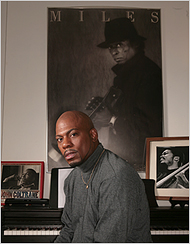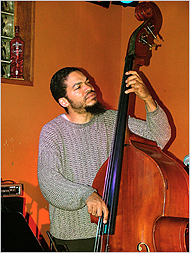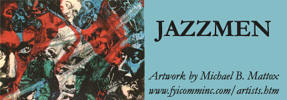By Corey Kilgannon
Growing up in the Bronx, Antoine Dowdell and his younger brother, Tarik, were jazz lovers who spent their allowance on Dinah Washington and Cannonball Adderley records, to the approval of their jazz-buff parents.
Tarik took up the upright bass at 12 and by adulthood was playing with the likes of Betty Carter, Ahmad Jamal, Abbey Lincoln and Art Taylor. He also became a Muslim, changing his name to Tarik Shah.
Though Antoine had taken up classical piano and was a promising recitalist, he longed to make a career in jazz but was frustrated at his difficulties in playing it. Lately he has turned to his brother for tutelage, but in a most unusual setting: in the visiting area of the Metropolitan Correctional Center in downtown Manhattan, where Mr. Shah, 44, has been held in solitary confinement since being arrested in May 2005 in New York on charges of terrorist activity. Federal authorities say he offered to aid Islamic militants and pledged loyalty to Al Qaeda and Osama bin Laden. He has pleaded not guilty; his trial begins on April 23.
While a public drama has played out in headlines and courtroom hearings over the terrorism charges, a private one between the two brothers has been occurring every other week in a special isolated visiting area of the jail. There they enter a booth and sit separated by a wire security screen, their conversation monitored by correction officers, and Mr. Dowdell takes a tutorial from his brother during which the two discuss jazz theory and sing passages to each other.
"We know the guards can hear us scatting and singing away, and they probably think we’re both crazy, or talking in code or something," said Mr. Dowdell, 49, who uses his brother’s left-behind collection of sheet music and handwritten practice exercises to help teach himself.
He says his brother’s inspiration and instruction from prison has helped him make huge strides as a jazz pianist who now gets paying gigs around the city, including a regular weekend engagement at the Caravan of Dreams restaurant in the East Village.
"All my life I studied the piano, but I was never able to play what was in my heart," Mr. Dowdell said. "I could never make the piano cry, maybe because I couldn’t get in touch with the blues. But seeing what’s happening to my brother — his music and his life unfairly taken away — I feel an urgency now to play his music for people. It’s like they took the jazz musician from my family and I have to fill that void."
In jail Mr. Shah has no access to an instrument or radio, but he has begun to write exercises, chord progressions and even compositions for his brother.
"It’s like he’s teaching me what he can no longer play, and I’m playing for him now, playing his pain," Mr. Dowdell said, pulling out some handwritten sheets of music in his Harlem apartment recently. "Here’s some stuff he wrote for me from jail."
Handwritten in pencil were several jazz cadences and progressions notated with standard harmonies and also with alternate sets of chords favored by John Coltrane, and others by Wes Montgomery.
There was also a 12-bar blues with tricky 16th-note passages and wide melodic leaps, to be played "slow and soulful."
The work’s long title is "I Don’t Have a Clue: A Chorus of Blues Permutation When I Don’t Even Have a Bass or a Leather Shoe."
Also written was a note to his brother: "Dear Tony, Here is the blues and the two-five chord substitutions we spoke about on our last visit. Love, your brother, Tarik. Let me know how this blues sounds."
Marlene Jenkins, 72, their mother, said Mr. Shah joked about writing enough music that his brother could perform it on a CD and call it "Jazz in the Joint."
"For all these months Tarik has heard no music, but it’s still in his mind, and he doesn’t want to lose it," she said. "You should see them in there, Tony playing his imaginary piano and Tarik playing scales up and down his imaginary bass, or singing a bass line for Tony. It’s a strange thing to see in that visiting area, but for that small window of time Tarik can feel like he’s free."
Mr. Shah was arrested as part of an elaborate federal sting operation that began soon after the 9/11 terrorist attacks. An F.B.I. informant posing as an Al Qaeda recruiter approached Mr. Shah and recorded him discussing sending money to aid Islamic militants fighting American troops in Afghanistan. Prosecutors say Mr. Shah possessed recordings of Mr. bin Laden and books on jihad and was recorded swearing allegiance to Al Qaeda and Osama bin Laden, and talking about enrolling in a terrorist training camp and using his martial arts expertise to train Al Qaeda operatives. He faces up to 15 years in jail if convicted.
Mr. Shah, his brother said, was known as the "Shah of Harlem" in uptown Manhattan clubs like St. Nick’s Pub, where he played twice a week and was known for encouraging and supporting younger musicians. Attempts to set up an interview with Mr. Shah, which involves red tape and delays, have so far been unsuccessful.
Mr. Dowdell said his brother studied with the bassist Slam Stewart.
"I watched him grow up, and I know his heart," he said. "He’s a New Yorker who loves his family and someone who has devoted his life to the greatest American art form, and now he’s being called un-American?"
Near the piano in Mr. Dowdell’s apartment was his brother’s electric bass decorated with Arabic inscriptions. The family is waiting for the outcome of the trial to decide whether to sell it, along with Mr. Shah’s double bass.
In their discussions in jail Mr. Shah told his brother to develop more direction to his improvised lines so they sound less like "doodling." He urged him to study chord progressions and to emulate Monk and Bud Powell, and in particular the spare style of Ahmad Jamal.
"I go back to see him," Mr. Dowdell said, laughing, "and the first thing he says: ‘Did you listen to Ahmad Jamal like I told you?"
On one visit Mr. Dowdell said he could not nail the rhythmic patterns of "Oleo," the Sonny Rollins melody, over the song structure of Gershwin’s "I Got Rhythm." Mr. Shah advised him to practice singing it as well as playing it.
"He told me, ‘If you can’t sing it, you don’t know it,’ "said Mr. Dowdell, who returned two weeks later and greeted his brother by scatting "Oleo" perfectly over a foot-tapping pulse.
Mr. Dowdell, who teaches students classical piano, had years of musical training, including the High School of Music and Art in Hamilton Heights and Clark Atlanta University, but in his improvised playing he lacked rhythmic and melodic direction. So Mr. Shah urged him to learn stride piano and to get in touch with one of Mr. Shah’s mentors, Ron Burton, who was Rahsann Roland Kirk’s pianist in the 1960s and played steadily with Mr. Shah around New York for years.
After a recent lesson in Mr. Dowdell’s apartment, Mr. Burton explained how playing Scott Joplin and Fats Waller tunes had helped Mr. Dowdell anchor his playing with a strong rhythmic left hand. He said he then introduced gradually more rhythmically advanced styles of Jelly Roll Morton and Erroll Garner before delving into more modern playing.
Mr. Dowdell said he had also taught himself songs he and his brother had memorized as children. He played a version of Dinah Washington’s "Blue Gardenia" from 1955, copying the lush Quincy Jones arrangement.
Mr. Dowdell said the jailhouse tutorials were a welcome distraction for his brother.
"For that short time we’re playing together and he’s no longer locked up," he said. "But just when we’ll be peaking musically, a guard will say, ‘O.K., your time’s up.’ Then I go home to practice, and Tarik goes back to his cell."

Antoine Dowdell, who often visits his brother, Tarik Shah, who is imprisoned. They love to discuss jazz. Photo by Fred R. Conrad NY Times

Tarik Shah performing at a New Jersey club in May 2005 before his arrest on a on charges of terrorism activity. Photo by Vincent Giantomasi Getty Images

